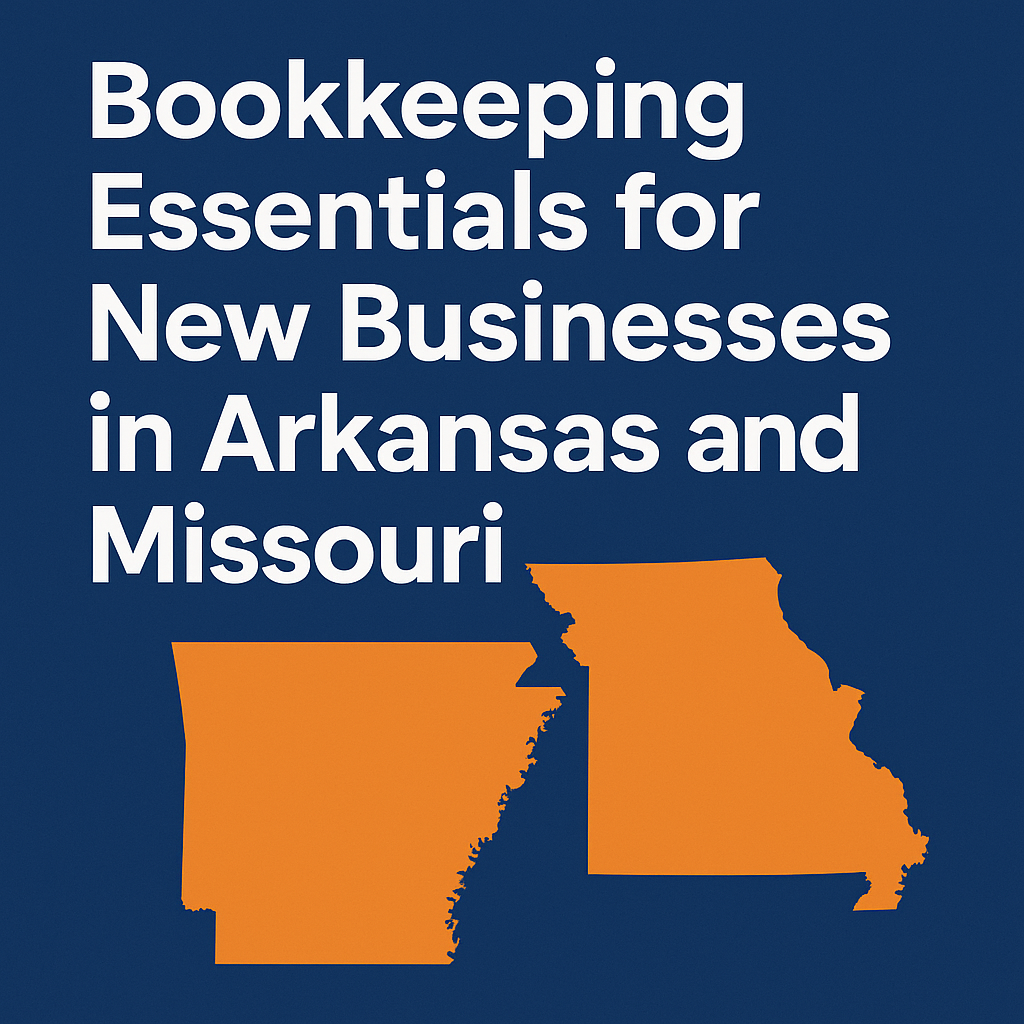Launching Your Business in Arkansas or Missouri: Building a Strong Financial Foundation
Starting a new business in Arkansas or Missouri is both thrilling and demanding. Establishing a solid financial foundation from the outset is essential for your business’s long-term success. A crucial element of this foundation is effective bookkeeping. Bookkeeping involves recording, updating, and maintaining financial records that accurately reflect your business’s transactions. It enables small businesses to monitor finances, gain insightful data, and make informed decisions. Effective bookkeeping goes beyond mere money management; it ensures the overall financial health and activity of your business. Without precise bookkeeping practices, financial transactions and expenditures can quickly spiral out of control, leading to confusion, disorganization, and potentially significant financial losses. Whether you choose to use accounting software like QuickBooks or enlist professional bookkeeping services, understanding the fundamentals of bookkeeping is vital for any small business owner. In this guide, we’ll walk you through the essential bookkeeping practices every new business in Arkansas and Missouri needs to know. From navigating state-specific regulations to establishing your bookkeeping system and managing daily transactions, we’ve got you covered to set your finances on the path to success.
Understanding State-Specific Regulations
When launching a new business in Arkansas or Missouri, comprehending and adhering to your state’s specific regulations is paramount. These regulations significantly influence your business’s financial health and operational compliance.
Business Registration and Tax Requirements
In both Arkansas and Missouri, registering your business is a critical first step. In Arkansas, you must register with the Arkansas Secretary of State, which includes verifying your business name’s availability, filing the appropriate formation documents (such as Articles of Organization for LLCs or Articles of Incorporation for corporations), and submitting the required filing fees. Similarly, in Missouri, you can register your business online by filing articles of organization for limited liability companies or other necessary documents for various business entities. Beyond registration, obtaining the necessary tax permits is essential. In Arkansas, this involves securing an Arkansas sales tax permit, while in Missouri, you need to register for state and local taxes as applicable. For instance, in Arkansas, you may need an Employer Identification Number (EIN) or use your Social Security number (SSN) for tax purposes.
Reporting and Compliance Deadlines
Maintaining compliance with state-specific reporting and deadlines is crucial for keeping your business in good standing. In Arkansas, businesses must fulfill various reporting requirements, such as annual franchise tax reports and sales tax filings. The deadlines for these reports can vary, so it’s important to stay organized to avoid penalties. Typically, annual reports for corporations and LLCs are due each year, and sales tax returns are filed monthly or quarterly depending on your business’s sales volume. In Missouri, businesses must also adhere to specific reporting deadlines, including filing annual reports with the Missouri Secretary of State and meeting tax filing deadlines set by the Missouri Department of Revenue. Missing these deadlines can result in fines and other penalties, so it’s essential to stay on top of all necessary filings to ensure your business remains compliant and financially healthy.
Setting Up Your Bookkeeping System
Establishing a robust bookkeeping system is fundamental to the financial health and efficiency of your small business in Arkansas or Missouri. Here are the key steps to get you started.
Choosing the Right Software
Selecting the appropriate accounting software is a pivotal decision in setting up your bookkeeping system. Various options are available, each offering unique features and benefits. Popular choices include QuickBooks, Wave, and other cloud-based accounting solutions. When selecting software, consider your business’s specific needs. For example, if you require automation of bookkeeping tasks such as transaction categorization, QuickBooks or similar software might be ideal. These programs can connect to your business bank accounts, allow your accountant to access the software, and help organize your chart of accounts. For smaller businesses or those on a tight budget, a free spreadsheet like Google Sheets can also be an effective and hands-on tool for managing your finances. This approach ensures a clear understanding of every transaction and compliance with minimal IRS requirements.
Developing a Chart of Accounts
A chart of accounts is a fundamental component of your bookkeeping system, as it categorizes and organizes all your financial transactions. This chart should be tailored to your business’s specific needs and include categories for assets, liabilities, equity, income, and expenses. Setting up your chart of accounts involves creating a comprehensive list of all the accounts your business will use to record financial transactions. This includes accounts for cash, accounts receivable, accounts payable, and various expense and income accounts. A well-organized chart of accounts simplifies the generation of financial statements and reports, such as balance sheets and cash flow statements.
Record-Keeping Practices
Effective record-keeping practices are the backbone of a reliable bookkeeping system. This involves choosing an accounting method and entry system that suits your business. You must decide between single-entry and double-entry accounting. Single-entry accounting is simpler, recording each transaction once as either an expense or income, making it suitable for smaller businesses with straightforward finances. In contrast, double-entry accounting records each transaction twice—as both a debit and a credit—providing a more comprehensive and accurate financial picture by tracking assets, liabilities, and equity in addition to income and expenses. Additionally, maintaining separate business and personal bank accounts is crucial for clear and organized record-keeping. This separation helps avoid mixing personal and business funds, making it easier to forecast cash flow, organize records, and file business tax returns. By implementing these practices, you ensure that your bookkeeping system is efficient, accurate, and compliant with all necessary regulations.
Managing Day-to-Day Transactions
Effectively managing daily transactions is vital for maintaining the financial health of your small business in Arkansas or Missouri. Focus on these key areas to ensure smooth financial operations.
Invoicing and Receivables
Efficient management of invoicing and accounts receivable is essential for sustaining healthy cash flow. Here are steps to manage this process effectively:
- Automate Invoicing: Utilize accounting software to automate the invoicing process. This includes setting up recurring invoices, sending reminders for overdue payments, and integrating with your bank feeds to track payments in real-time.
- Track accounts receivable: Regularly review your accounts receivable aging reports to identify overdue payments. Schedule these reports to be sent to your inbox daily or weekly to stay updated on the status of your receivables.
- Follow Up on Overdue Payments: Establish a systematic approach to follow up on overdue payments. This could involve sending polite reminders, making phone calls, or offering discounts for early payment to encourage timely settlements.
Handling Payables and Expenses
Managing accounts payable and expenses is equally important to prevent unnecessary penalties or damage to your credit score. Implement the following practices:
- Track Upcoming Expenses: Monitor upcoming expenses and regularly update your books to reflect them. This aids in budgeting and ensures you have sufficient funds when payments are due.
- Reconcile Accounts: Regularly reconcile your bank accounts to ensure that all payables and expenses are accurately recorded in your books. This involves matching every debit and credit with supporting documents to correct any errors.
- Set Aside Funds: Allocate funds for payables, such as taxes and other recurring expenses, to avoid last-minute rushes and potential penalties. For example, transfer GST or other taxes into a separate bank account to keep them distinct from your cash flow.
Payroll Management
Payroll management is another critical aspect of daily transactions, especially if you have employees. Follow these steps to ensure accurate and compliant payroll processing:
- Automate Payroll: Use accounting software or dedicated payroll tools to automate payroll processing. This includes calculating salaries, taxes, and benefits, as well as generating pay stubs and tax reports.
- Comply with Tax Obligations: Ensure compliance with all tax obligations related to payroll, such as withholding taxes and superannuation (if applicable). Set aside these funds in advance to avoid penalties when payments are due.
- Regularly Review Payroll Records: Periodically review your payroll records to ensure accuracy and compliance. This includes verifying employee data, hours worked, and any changes in tax rates or benefits.
By diligently managing these daily transactions, you maintain a clear financial picture, ensure compliance with regulations, and make informed decisions to drive your business forward.
Conclusion
Whether you’re launching your first venture or managing a rapidly growing company, maintaining a robust bookkeeping system is essential for your business’s success. Here are the key takeaways:
- Understand State Regulations: Comply with Arkansas and Missouri’s specific business registration, tax requirements, and reporting deadlines to avoid penalties.
- Set Up Your Bookkeeping System: Choose the right accounting software, develop a comprehensive chart of accounts, and implement effective record-keeping practices.
- Manage Day-to-Day Transactions: Efficiently handle invoicing, accounts receivable, payables, expenses, and payroll to ensure smooth financial operations.
For a seamless and stress-free financial management experience, consider partnering with a professional service like OBS Financials. With over a decade of experience, certified expertise, and a genuine passion for helping business owners succeed, OBS Financials offers more than just bookkeeping—they provide peace of mind. From financial cleanup to payroll, monthly bookkeeping, and CFO-level insights, their flat-rate, insured services are designed to grow with your business. Book a free consultation today and discover how OBS Financials can help you reclaim your time, reduce stress, and make smarter financial decisions—all with a partner who treats your business like their own.
FAQ
What are the key components of effective bookkeeping for a new business in Arkansas and Missouri?
Key components of effective bookkeeping for a new business include:
- Separating personal and business finances.
- Choosing the proper accounting method (cash-basis or accrual-basis).
- Setting up a structured chart of accounts.
- Implementing accounts receivable and accounts payable.
- Following GAAP and maintaining common financial reports.
- Managing cash flow and conducting regular reviews.
- Using either manual or digital bookkeeping systems carefully.
How can a new business in Arkansas and Missouri benefit from using web-based accounting software?
A new business in Arkansas and Missouri can benefit from using web-based accounting software through enhanced accessibility, allowing financial data access from any device with internet connectivity. It also provides real-time updates, reduces costs by eliminating the need for expensive software and hardware, and includes automatic maintenance and upgrades. This setup supports remote work, increases efficiency by up to 20%, and enables quicker, more informed financial decisions.
What is the importance of separating personal and business finances when starting a new business in Arkansas and Missouri?
Separating personal and business finances is important for protecting personal assets from business liabilities, streamlining bookkeeping and tax reporting, and ensuring compliance with tax regulations. It also helps in maintaining clear financial visibility, reducing the risk of IRS audits, and building a strong business credit score.
This separation is essential for legal protection and efficient financial management, regardless of the location, including Arkansas and Missouri.
What steps should a new business in Arkansas and Missouri take to set up a business bank account and obtain an Employer Identification Number (EIN)?
To set up a business bank account in Arkansas and Missouri, provide valid identification for both the individual and the business, including a Social Security Number or tax identification number, and additional documentation such as a Business License, Fictitious Name Registration if applicable, and identification for all signers on the account. To obtain an Employer Identification Number (EIN), apply through the IRS website, providing the business name, address, and the responsible party’s Social Security Number or tax identification number.




